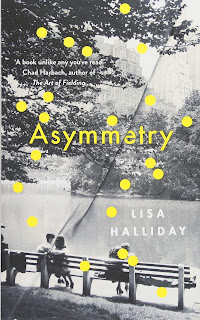Asymmetry - Lisa Halliday
Lisa Halliday’s Asymmetry certainly doesn’t set itself up as being a great novel that aspires to being part of the literature of everything we are and everything we know, its slim 288 pages suggesting rather that it has more modest ambitions. It’s certainly structured in a simple fashion and written unpretentiously in a light and casual manner, but along the way it draws in all manner of personal life moments, historical events and experiences and manages to tie them into something bigger. In a manner that is becoming more common (see Donal Ryan’s recent From a Low and Quiet Sea), the novel is divided into distinct sections with different narrators that appear initially to have not much in common, but are later revealed to be related in a surprising way; a way that opens up and expands their horizons and presents a much wider view of thoughts, ideas and life than you would otherwise think possible to encapsulate into such simple stories.
Asymmetry is divided into three distinct parts; the first ‘Folly’ is related by Alice or Mary-Alice, a 25 year old editorial assistant for a New York publisher; the second ‘Madness’ is related by a young Muslim man, Amar Ali Jaafari, born in Iraq but studying Economics in America where he is working on his PhD. The third section ‘Ezra Blazer’s Desert Island Discs’ is as it suggests a transcript of a radio programme where a great Nobel Prize winning American author looks back over his life, the music, and the women that have been an important part of is life. The third part is most evidently related to the first novella-length section, since it’s almost entirely an account of Alice’s affair with multiple Pulitzer Prize winning and Nobel Prize in waiting author Ezra Blazer, but there are clues to how the middle novella relates to their story, as well as the implications that this brings to the novel as a whole.
I suppose you could find a young 25 year old editorial assistant’s affair with an aging and ailing older man with a serious heart condition somewhat queasy, but there’s nothing in Mary-Alice’s account that strikes you as being anything more than it is; the love of a young woman for an older man with neither making any great claims on the other, but both clearly learning and sharing a great deal despite the differences in age and life experience. There’s give and take and nothing is taken for granted. Certainly Halliday’s writing, by focussing on the two of them keeping their relationship secret and leaving the rest of the world largely out of the equation, makes it feel much more casual, relaxed and simple. The exchanges are warm and caring, but not without some moments of concern at the folly of what they are doing. And, since one is a writer and the other an aspiring writer, the outside world and their place in it can’t be ignored, and it does come into the book mainly in Ezra’s sharing of his life experiences and his love for literature and music, but war and history also are inevitably tied into such things.
On the surface then, there would be little to connect Alice’s story with Amar Ali Jaafari’s account of being detained by UK Immigration on a stop-over before flying on to Istanbul and then onward to visit his brother in Kurdistan in northern Iraq. What after all would a former choirgirl from Massachusetts have in common with an American Muslim boy whose parents were born in Iraq? While he is interviewed and begins the interminable and inexplicable wait that will determine the outcome of the rest of journey, Amar reflects on his previous visit to Iraq, soon after the American invasion and the fall of Saddam Hussein, where he witnesses the very real feeling on the ground and discusses the impact of the invasion with the people of his home country, and it’s a very different view from the narrative that we are given in the west. In some respected then, the two stories are very loosely connected in terms of providing a perspective of East and West, of youthful innocence and the experience of old age and various other supposed polar opposites, finding common experiences and views in them and a whole lot of ‘in-between’.
There’s a feeling occasionally that Lisa Halliday is trying to take on rather a lot within the confines of a relatively short debut novel, her targets too wide-ranging and expansive to really settle on any one idea or outlook on the world. Or perhaps the novel is merely pointing out that the world is indeed too filled with disparities to make any simple equivalencies or connections between them. With references to Dickens, Joyce, Camus and Arendt among many other literary, philosophical, historical and musical references, it’s surely over-reaching to try and pull them together into something consistent and meaningful. And yet, while I didn’t think that the Amar story really held together as a self-contained piece on its own in the way that Alice’s story did, in other ways the disparity between them and the connection that unites them does suggest that this is part of the whole purpose. The seemingly ‘flawed’ asymmetry is recognised, and it’s all part of what makes life – and writing – something magical and capable of revealing something new and unexpected. It’s fairly obvious from ‘Folly’ that Halliday had a well-known and influential mentor, but to get everything she does into a first novel is nonetheless quite an achievement.
Asymmetry by Lisa Halliday is published by Granta on 1st March 2018.




Comments
Post a Comment